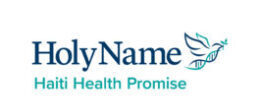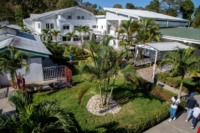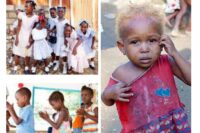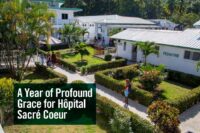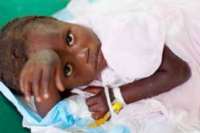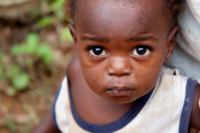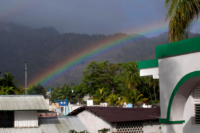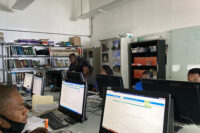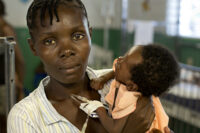Dispatches from Haiti
Carol Fipp and Pat Balanky
Thursday, October 2, 2008
What makes a difference in Haiti
Pat Balanky and Carol Fipp
As usual, Carol and Pat split up for the day. Carol is off to tour the compound’s facilities to get updates on improvements for the donors who contributed them. The new latrine donated by Holy Family Church in Jacksonville is a huge improvement for the hospital population. It can serve forty people at one time. It is modern with tiled walls, ventilation and flushing toilets! This is a new experience for most Haitians.
However, the hospital has many other needs. In Radiology, the x-ray machine is thirty to forty years old. Film is developed by hand and hung to dry with clothespins in front of a fan. The three lead aprons worn by the x-ray technicians are splitting at the shoulder seams. In Records, there are over 41,000 manually kept charts on file and little space in which to house them. In the Pediatric ward, the 22 cribs are all full. The incubators and medical equipment occupy the same space. There are few toys. As this is an open-air hospital, the rooms are hot and humid. The nurses have their hands full providing medical treatment to the patients while their families provide all of the feeding and bathing.
The hospital has a Nutrition and Feeding Center that provides two meals a day for malnourished children ages one through five. Eighty-five children are cared for, which is double the usual number due to the skyrocketing food costs.
There is also a Food Distribution program for adults. The hospital has been distributing food on a daily basis since the hurricanes. There was a long waiting line for the beans, corn meal and cooking oil. Here are truly the poorest of the poor. Each person must bring their own containers, which are filled using makeshift funnels. They receive enough for one week’s meals. After obtaining their rations, they carry it home on their head, the jug of oil at their side. Carol gave her shoes to one lady who was in dire need. She was wearing hard-soled shoes that were way too small. She had flattened down the backs and her heels hung about an inch off the back of the shoes. It looked like we wore about the same size and she was immensely grateful.
Today’s surgeries were long and involved. We completed all of the scheduled cases successfully. The boy with the badly injured arm that had been crushed by a falling cinderblock was smiling when the doctors visited him several hours after surgery. It was a very successful outcome with a happy ending. We also operated on a second baby with club feet, a woman with an injured arm and a boy with an infected hand. Before the boy’s operation, one of his fingers was swollen to twice the normal size, the bone protruding and the fingernail missing. His pain was intense, to say the least. He will feel much better tomorrow. Our surgeons are Dr. Chris Smith of UF-Shands Jacksonville, Dr. Dick Sibley and Dr. Bill Sale, both of Charleston, West Virginia. Dr. Peter Kovacs of Jacksonville and Marty Henley of Charleston provide anesthesia. Pat Balanky is the operating room nurse.
Two involved surgical cases are on the agenda for tomorrow: an open fracture of the tibia and an open reduction and internal fixation of the ankle. In addition, some of the doctors are in clinic every day treating other patients who don’t require surgery. This has been a very successful and rewarding trip and most of this team will be back next year. Our next team will be coming down in February, lead by Dr. John Lovejoy of Jacksonville and the following team will go in May, lead by Dr. John Mazur of Jacksonville. If you are a licensed medical professional in orthopaedics, anesthesia, nursing with orthopedic experience, or physical therapy, and are interested in joining one of our teams, please contact Carol Fipp at cfipp@yahoo.com. It is an extremely rewarding experience and the Haitian people really need you.
Or, if you are interesting in donating:
The Crudem Foundation, Inc. is a 501(c)(3) nonprofit organization that supports Hopital Sacre Coeur in Milot, Haiti. Your gift is tax-deductible.
Faces from Jacksonville in Haiti
Loubens Jean-Louis, a physician assistant from Jacksonville, has been invaluable to our team for both his medical skills and translation abilities.
He was born in Haiti and is fluent in English and Creole, and is pictured here at the left, with Dr. Chris Smith, right, an orthopedic surgeon also from Jacksonville. Both have been working on a volunteer team in Haiti for the last week.
Nutrition needs grow
Carol Fipp and Pat Balanky
The Sacred Heart Hospital in Milot, Haiti also has a Food Distribution program for adults. The hospital has been distributing food on a daily basis since the hurricanes. There was a long waiting line for the beans, corn meal and cooking oil. Here are truly the poorest of the poor. Each person must bring their own containers, which are filled using makeshift funnels. They receive enough for one week’s meals. After obtaining their rations, they carry it home on their head, the jug of oil at their side.
The hospital also has a Nutrition and Feeding Center that provides two meals a day for malnourished children ages one through five. Eighty-five children are cared for, which is double the usual number due to the skyrocketing food costs.
Wednesday, October 1, 2008
Surgeries, misery — and beauty
Pat Balanky and Carol Fipp
It’s evening and we’ve just debriefed after the day’s events. This is our usual routine after a day of surgery, clinic and unexpected adventures. Carol and I walked from the Guest House Quarters to our adjoining rooms in pitch-black darkness. In Haiti, there are no street lights and flashlights are an absolute necessity.
Earlier today, Carol went off to participate in the mobile clinic program that gives extended care and education to the population surrounding Milot. Today’s agenda focused primarily on the prevention and treatment of malaria, HIV and sexually transmitted diseases. Repetition of basic preventative measures seems to be necessary.
Back at the hospital, surgeries continued and new cases were presented at the clinic. Loubens Jean-Louis, a physician assistant from Jacksonville, has been invaluable to our team for both his medical skills and translation abilities. He was born in Haiti and is fluent in English and Creole. A teenage boy came in from Cap Haitien with an open arm fracture that occurred last five days ago. He was climbing a cinderblock wall and fell, bringing one of the blocks down on top of his arm and smashing it. The wound is severe and the bone is broken. It will require surgery with plates and screws and skin graft. He is a lucky young man that the orthopedic team is in Milot.
Another patient we saw is not as fortunate. A 19-year-old girl came in to clinic with a fractured neck. She fell climbing a tree and as a result, is paraplegic. To make matters worse, her emaciated condition confirms that she is infected with AIDS. Her superficial wounds were treated but there is no cure for her problems. This is all too common in Haiti.
Life is simple here, yet difficult. Much of the day is spent getting water from the well across the street from the hospital and going to market to get food for that day’s meals. There is almost no plumbing or refrigeration. The laundry is done outdoors in large plastic washtubs and hung on cactus or laid on the roof to dry. Cleanliness is extremely important.
At the end of the day, we walked with one of the locals who lives close to the hospital, knows some English and befriends all of the medical volunteers. He escorted us into the neighborhood. It was dusk and oil lanterns lit the interiors of the homes. It was interesting to see inside when we could. People were cooking outdoors with charcoal. This causes another problem for Haiti. As the forests are depleted of wood for making charcoal, there is little reforestation. When the rains come, so does the mud.
As we walked, people waived and were cheerful. The children ran up to touch our hands or give a high-five. We always feel welcome by everyone and there is little to no crime in this area.
Our week is flying by quickly and the team is trying to do every case it can in our short time here. For many of the Haitians, their next opportunity may be a long time away. Our team has four surgeries scheduled for tomorrow and the doctors are busy studying the medical textbooks in the Guest House. They often refer to the textbooks, as the medical instruments they will use here are much older and different than those in the United States. Everyone will get a good night’s sleep – until the roosters start around 4:00 a.m.
Tuesday, September 30, 2008
After surgery
Carol Fipp and Pat Balanky
A young child in Milot, Haiti, received surgery to correct club feet at the Sacred Heart Hospital on Monday. The surgery was performed in part by a volunteer team from Jacksonville. Two members of the team, Carol Fipp and Pat Balanky, are blogging all this week on their experiences.
During surgery
Carol Fipp and Pat Balanky
Club foot is affecting two of the children being treated by a volunteer orthopedic team, including Pat Balanky and Carol Fipp of Jacksonville. Here, one of the children is show during the surgery, which is fairly simple.
Before surgery
Carol Fipp and Pat Balanky
Jacksonville volunteers in Milot, Haiti, are part of the orthopedic rotation at Sacred Heart Hospital. Among their patients were two children with club feet, a condition that can be debilitating but can be corrected with simple surgery. Here, retired surgical nurse Pat Balanky holds one of the children who had surgery on Monday.
Tuesday: Life after the storms
Carol Fipp and Pat Balanky
The days start out quieter than usual. The opening of all schools has been delayed a month throughout the country due to the storm damage and fuel cost. So there are no school children on the streets to greet us. We walk about a block to the hospital from our quarters exchanging “Bon Jours” to the passersby. They are accustomed to the medical volunteer groups that serve them. We pass people pulling pigs, toting large bundles of charcoal, and women with large wash buckets on their heads going to do their laundry. The well just outside the hospital gate provides water to the community.
This morning we went to the hospital around 5:45 a.m. Most Haitians don’t live by alarm clocks; they live by the sun. Since Haiti is on Central Time, the sun rises around 5:30 am.
The hospital was surrounded by patients waiting for the gates to open. As today is Prenatal Clinic, a long line of expectant mothers wait along the fence, hanging their purses on the fence-posts to hold their place in line. Inside the hospital grounds are mothers taking care of their children in the Pediatric Ward. The mothers sleep on the benches outside of Pediatrics while their children are in the hospital.
Our team begins to scrub and get ready for the scheduled surgeries. Each of our three orthopedic volunteer groups takes the current chief orthopedic resident from UF-Shands Hospital as part of the team. The residents are always amazed at the advanced stages of the medical conditions exhibited by the patients. There is very little orthopedic care available in Haiti.
One patient we saw yesterday has had a dislocated finger for two weeks and is in great pain. He has been waiting for the orthopedic team to arrive. Without care, he could lose the finger. Yesterday’s surgeries included a one-year-old baby with club feet that will now be able to walk normally. Another operation saved the chronically-infected bone in the leg of a 25 year-old young man. The Haitian people are amazingly tough and strong. The pain medication following surgery is frequently limited to merely aspirin. They are always grateful to our volunteer teams and we feel it is a privilege to serve them.
Monday, September 29, 2008
The clinic
Carol Fipp and Pat Balanky
This photo was taken on Saturday at the clinic at Sacred Heart Hospital in Milot, Haiti, the day our team of volunteers arrived from Jacksonville and other parts of the nation. The hospital volunteer team is coordinated through the Crudem Foundation.
Monday, September 29, 2008
Sacred Heart Hospital
Pat Balanky and Carol Fipp
Sacred Heart Hospital is where the Crudem Foundation volunteers are working this week. This photo shows the building from the outside.
Monday, September 29, 2008
Monday update: Surgery, roosters, hiking
Carol Fipp and Pat Balanky
We awoke this morning to the sound of roosters crowing 4:15 a.m. The locals say that Haitian roosters can’t tell time. We believe it.
We had a sound night’s rest recovering from a long and hectic day. The clinic served 64 orthopaedic patients on Saturday and we selected four cases for Monday’s surgery. One of the saddest cases presented is a sixteen year-old girl with a cancerous bone tumor involving her left femur. Unfortunately, she has had no treatment and her prognosis is poor. One of our orthopedists had to tell her and her family that she needs radiation and chemotherapy. This is not readily available to her in Haiti. Her family does not have the money to send her abroad. After careful consideration, the only recommended treatment is amputation, which would make her more comfortable. So they are considering this. Happily, we have two club-footed youngsters who need fairly simple procedures to assist with walking and those will be accomplished.
On Sunday morning, since the hospital was closed, some of our group made the journey to the Citadel, the historic fortress at the mountaintop just outside of Milot. It was a strenuous hike and the sun was making its presence known! As the day wore on, we made our way back home through the village. Some of our team had been to church along with the nuns, who are the administrative core of the hospital. The little girls had ribbons in their hair, and despite their poverty, the people were clean and nicely dressed. The hurricanes damaged the local gardening efforts that they depend upon for their daily diet. Many dwellings lost roofs or part of their structure. We saw efforts to rebuild using machetes and small hand-cut timbers. Fortunately, Milot did not suffer loss of life from the storms, which occurred in much of the country.
In the afternoon there was a local soccer game that some of our team attended. Amidst the struggling circumstances, soccer is still an enjoyable past time for the people. The field was horribly maintained but didn’t stop the athletes and very enthusiastic fans from having a good time.
The weather is hot and humid and the climate causes problems with supplies, construction of the buildings, and equipment, both medical and non-medical. Termites have devoured the pallets in one of the storerooms. Furniture in the Guest House at Sacre Coeur (Sacred Heart) Hospital is damaged. Doorjambs, roofs, etc. are all affected. Maintenance is an issue. There is a wonderful contribution of a window air-condition unit in each of the two operating rooms. We are fortunate to have electricity at our quarters and throughout the hospital due to the generosity of our donors. In Cap Haitien, one family we talked to has electricity only one to two hours a week. But they seemed in good spirits.
Our group has bonded and we look forward to the week!
Monday, September 29, 2008
Arrived safely in Haiti
Carol Fipp and Pat Balanky
Bou Jour!
The team got up around 3:00 a.m. and went to the airport. Lynx now flies two planes, 10 minutes arpart, from Fort Lauderdale to Cap Haitien. Our team got split into two groups – par for the course, so far – but we rolled with the punches and all arrived safely in Haiti around 8:30 a.m. local time (9:30 am Eastern).
The roads from Cap Haitien to Milot are considerably worse according to those who have been here before. The eight mile ride now takes one full hour. Two vehicles arrived to pick up the eleven of us: it was Sister Martha and Sister Joanna. They seemed as truly glad to see us as much as we were to see them! We piled all the luggage into one vehicle, then split up again into the two cars for the ride. Some of us were riding in the very back of the Land Rover and it was pothole after pothole after pothole – a real bonding experience!
Now the team has filled their water bottles, changed into scrubs and has started clinic. There are at least 60 patients waiting for the doctors. The team will see every single one and determine which cases we can do for the week. We do all the orthopaedic cases we can, but are limited by available equipment and complexity of the procedure. All three of the doctors have a dedicated interpreter for clinic which is great. I have never met eleven more energetic, positive folks who are ready to roll up their shirtsleeves and work hard. What a great team! I was also greated with another little treat – Sister Martha has planned a daily ”orientation/tour” for me so that I can get to know the hospital and staff. I even get to go with traveling clinic on Wednesday – isn’t that great?! It IS hot here but we can all take the heat. The two boxes of Krispy Kreme donuts and the Nestle chocolate chips for the staff seem to have secured my daily internet access for the week! (woo-hoo!)
Please pray for the team that they can do good work and help as many people as possible. The line for the clinic this morning is very long and the people look hot, tired and some, in pain. My heart goes out to them. Times like this sure make me wish I could do something to help.
Monday, September 29, 2008
Haiti Blog
The anticipation is building! Pat Balanky and Carol Fipp are eagerly looking forward to our medical mission trip to Haiti. Our team has been planning it for months and we are writing this blog together. Today we drove to Fort Lauderdale where we met up with the rest of the team. Our team consists of eleven people: two orthopaedic surgeons, one UF-Shands orthopaedic resident, one anesthesiologist, one nurse-anesthetist, two physical therapists, one OR nurse (Pat), one physician assistant, a family member and me. I am non-medical, but do the administrative work to organize and coordinate the teams. Arriving in Fort Lauderdale was a great reunion of four old acquaintances and seven new. Five of the team are from Jacksonville, four are from Charleston, West Virginia and two are from Shelbyville, Illinois. We are staying in what you would politely call “frugal” accommodations and had a great meal at a local seafood restaurant. Everyone ate well, as we know that in the upcoming week, the meals will be different. We are all traveling light so we can take as many medical supplies as possible. We are limited to fifty pounds per person on a 19-passenger plane. Tonight we are back in our rooms, enjoying the comforts of a hot shower, a last look at television and making our last cell phone calls – all things that we will not enjoy for a week.
We are headed to the northern region of the country to a village called Milot, a few miles south of Cap Haitien, the second-largest city in Haiti. We are volunteers with the Crudem Foundation that supports Hopital Sacre Coeur (Sacred Heart Hospital). We created the Crudem Support Group of Jacksonville that sends an orthopaedic team to Haiti three times a year. Sacred Heart is a 64-bed hospital with approximately 4,000 in-patients and more than 60,000 outpatients annually. They have medical staff that includes general surgeons but most specialists are visiting volunteer teams from the United States. The hospital has medical team of volunteers every other week including orthopaedic, pediatric, OB-GYN, urology, ophthalmology, and dentistry.
Haiti suffered greatly from the recent three hurricanes, and both media reports and our internal contacts tell us that the misery grows by the day. We are eager to see the situation for ourselves and to get to work. We even felt the effects in the final day before our departure. We heard that gasoline in Cap Haitien is up to $15 a gallon – if you can even find a gas station that has fuel. The roads between Port-au-Prince, the country’s capital, and Cap Haitien were destroyed during the storms and fuel trucks are not able to get through to Cap Haitien. On Thursday, the day before we were leaving, we learned that our commuter plane between Fort Lauderdale and Cap Haitien must now go to Port-au-Prince to refuel between flights. That meant that our departing flight is now later than originally scheduled and many of the non-Jacksonville team members would miss their connecting flights. We had to do unexpected, last minute scrambling to rebook, but Delta accommodated us without charging fees. It was much appreciated.
Our plane leaves at 6:30 am tomorrow morning for the three-hour flight to Haiti. Yes, you read that right: we have a 3:00 am wake-up call. Good night. You will have to tell us about the presidential debates.
